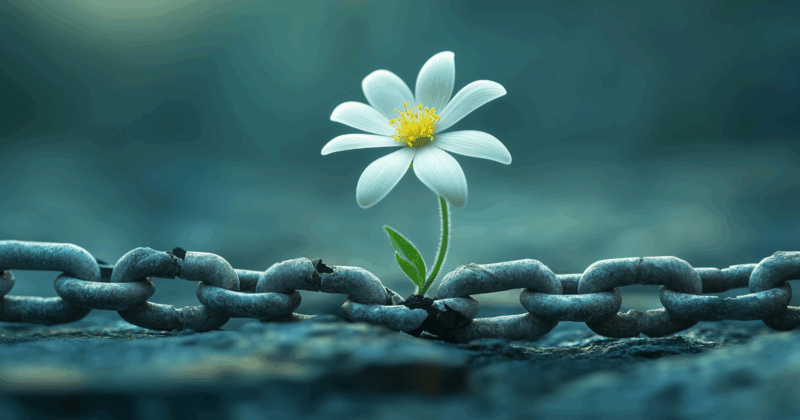We all love the idea of resilience. It sounds heroic, doesn’t it? But in real life, it rarely looks that way.
When you think about people who refuse to give up, it’s often not about grand speeches or cinematic comebacks.
It’s about the quiet, sometimes lonely, decision to get up one more time. To keep walking when no one’s watching. To believe there’s a way forward, even when you can’t see it yet.
That quiet strength fascinates me—not because it’s flashy, but because it’s deeply human. And it’s something we all have access to.
Resilience is not something you’re born with
One of the biggest myths I’ve seen is that resilience is a personality trait—you either have it, or you don’t. But the research says otherwise.
As psychologist Martin Seligman put it, “The remarkable attribute of resilience in the face of defeat need not remain a mystery. It was not an inborn trait; it could be acquired.”
That line hit me hard when I first read it. Because for years, I thought I was someone who lacked resilience. I’d get knocked down by setbacks and think, maybe I’m just not built for this.
But slowly, through small practices—things like mindfulness, reframing failure, and taking care of my body—I realized resilience is more like a muscle. The more you train it, the stronger it gets.
The quiet lessons of hitting rock bottom
There’s another truth about refusing to give up: sometimes it doesn’t come from strength at all. Sometimes it comes from hitting the floor so hard you’ve got no choice but to use it as a foundation.
J.K. Rowling described this perfectly when she said, “Rock bottom became the solid foundation on which I rebuilt my life.”
I can relate. The lowest points of my own life—failed ventures, broken relationships, moments of complete self-doubt—ended up being the times where I rebuilt myself. Not because I wanted to, but because life gave me no alternative.
The beauty of rock bottom is that it strips away illusions. You see what actually matters. And from that raw honesty, you begin again.
Why small steps matter more than big wins
Here’s what I’ve noticed: people who quietly refuse to give up don’t usually make loud announcements. They take small steps. Sometimes painfully small.
The American Psychological Association has noted that, “Psychological research demonstrates that the resources and skills associated with more positive adaptation (i.e., greater resilience) can be cultivated and practiced.”
That word—practiced—is everything. Resilience isn’t just an inner quality. It’s what you do daily.
You practice showing up. You practice taking one more step, even when you’re tired. You practice choosing growth over despair.
I’ve seen this in my own life when I got into running. I didn’t start because I wanted medals or to run marathons. I just wanted a way to keep my head clear. And at first, I couldn’t even manage a kilometer without stopping. But over time, those small steps became miles.
And running became a metaphor for everything else—quiet persistence, practiced daily, transforms you.
Facing pain without flinching
One of the hardest parts of resilience is facing the emotions that come with failure and struggle.
I used to fight my own emotions, thinking fear or sadness were weaknesses. But the truth is, resisting them just made things worse.
A good friend of mine, Rudá Iandê, wrote a book that really shifted how I see this. In Laughing in the Face of Chaos, he says:
“Fear, when understood, is not our enemy. It’s an intrinsic part of the human experience.”
That insight helped me stop treating fear as a sign I was failing. Instead, I began seeing it as part of the path. The people who refuse to give up aren’t those who never feel fear—they’re the ones who make space for it and keep moving anyway.
Learning to rebuild yourself
I don’t think resilience is about becoming unbreakable. It’s about learning how to rebuild.
Sometimes that rebuild is messy. Sometimes it’s slow. But each time, it leaves you with a stronger foundation and a deeper understanding of yourself.
What’s fascinating is that science, philosophy, and personal stories all point to the same thing: resilience is a skill. You don’t need to be special to develop it. You just need to be willing to keep practicing.
Final words
Resilience isn’t about never falling. It’s about how you rise when you do.
People who refuse to give up don’t always look strong on the outside. They’re often scared, tired, and doubting themselves. But their quiet strength comes from something deeper: the willingness to keep going.
As I’ve learned, even from my own failures, resilience is built step by step. It’s practiced in the dark, not performed in the spotlight.
So if you’re going through something right now, don’t pressure yourself to be perfect. Don’t think you need to prove your strength with big wins.
Just focus on the next step. And then the one after that.
Because one day, you’ll look back and realize that your quiet persistence—that decision to not give up—was the loudest strength of all.
- People who still look young in their 60s and beyond usually adopt these 8 daily habits - September 22, 2025
- Psychology says people who are naturally kind but have no close friends often display these 7 traits - September 19, 2025
- People who stay joyful in their 70s almost always share these 7 traits - September 18, 2025
